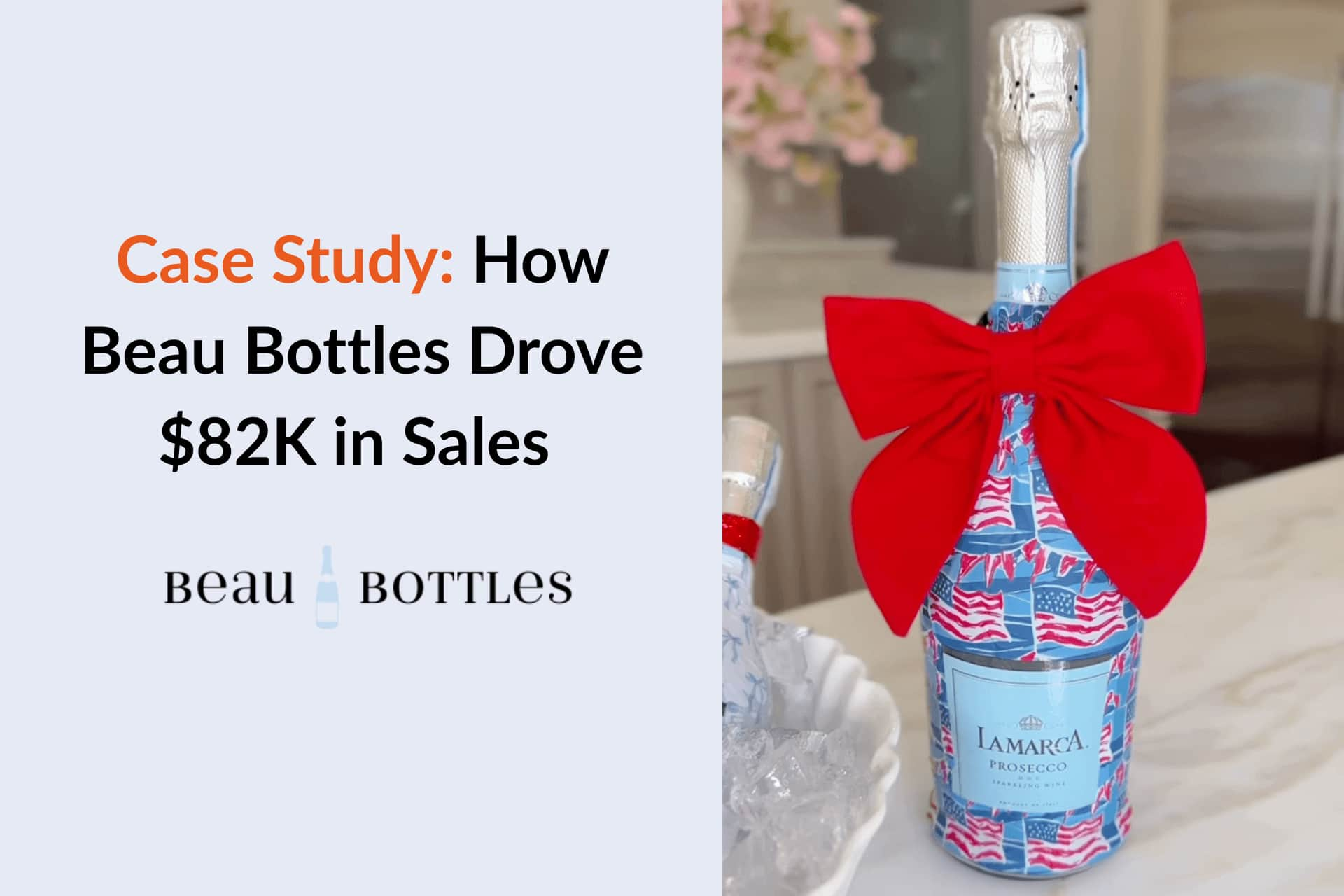





Influs is widely recognized for its AI-driven influencer matching, performance analytics, and campaign tracking. However, big platforms sometimes also have key drawbacks: a steep learning curve for onboarding teams, limited flexibility in outreach workflows, and pricing that can be a stretch for small businesses.
These pain points, combined with demands for larger creator databases and broader platform integrations, are what’s driving brands to explore alternatives.
In this article, we’ll compare Influs to 10 top alternatives to help you pinpoint the platform that aligns best with your business needs.
Top 10 Influs Alternatives:
While Influs offers strong AI-driven influencer matching and analytics, brands' feedback reveals several recurring pain points that lead brands to explore other platforms.
While Influs offers advanced features like AI-driven influencer matching and real-time analytics, many users mention that the platform can feel overwhelming at first. New users often require extra onboarding time to understand all functionalities, slowing down campaign launches.
Marketers noted that the outreach tools, though functional, lack deeper customization for message sequences, personalization tokens, and multi-platform outreach in a single workflow. This can limit campaign adaptability for brands with diverse influencer pipelines.
Multiple reviews highlight that Influs pricing—starting at nearly $50/month and going up to $200+/month—may be reasonable for agencies but can feel expensive for startups or small D2C brands. Users expressed that comparable features are available at lower costs with other platforms.
While Influs has a quality influencer pool, Reddit discussions suggest that its searchable database is smaller than larger platforms like Modash, CreatorIQ, or HypeAuditor. This can make finding niche creators—especially in less saturated industries—more challenging.
Our comparison focuses on several key aspects:
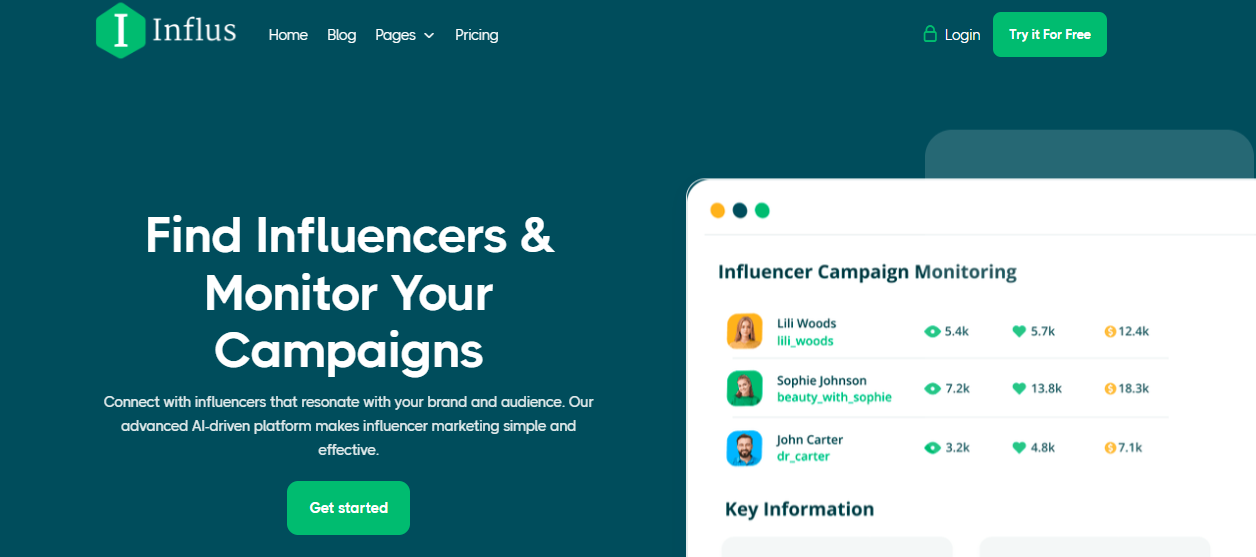
Best For: Influs is ideal for brands and agencies (small to large) aiming to leverage AI-driven influencer discovery, audience analytics, affiliate tracking, and ROI measurement, especially those who want to integrate with e-commerce tools like Shopify or Refersion.
Platform Coverage:
Pricing: Influs offers three subscription tiers depending on your needs:
Note: All plans come with a 14-day free trial, no credit card required.
Reviews: 4.2 / 5.0 (AI Chief)
Ease of Use (UX/UI): Users consistently describe Influs’s interface as intuitive and easy to navigate. Trustburn reviewers emphasize that campaigns are easy to set up and the platform is user-friendly. AIChief also rates the interface favorably.
Customer Support: According to multiple Trustburn user comments, Influs’s support team is responsive and helpful, with users noting quick assistance and a reliable support experience.
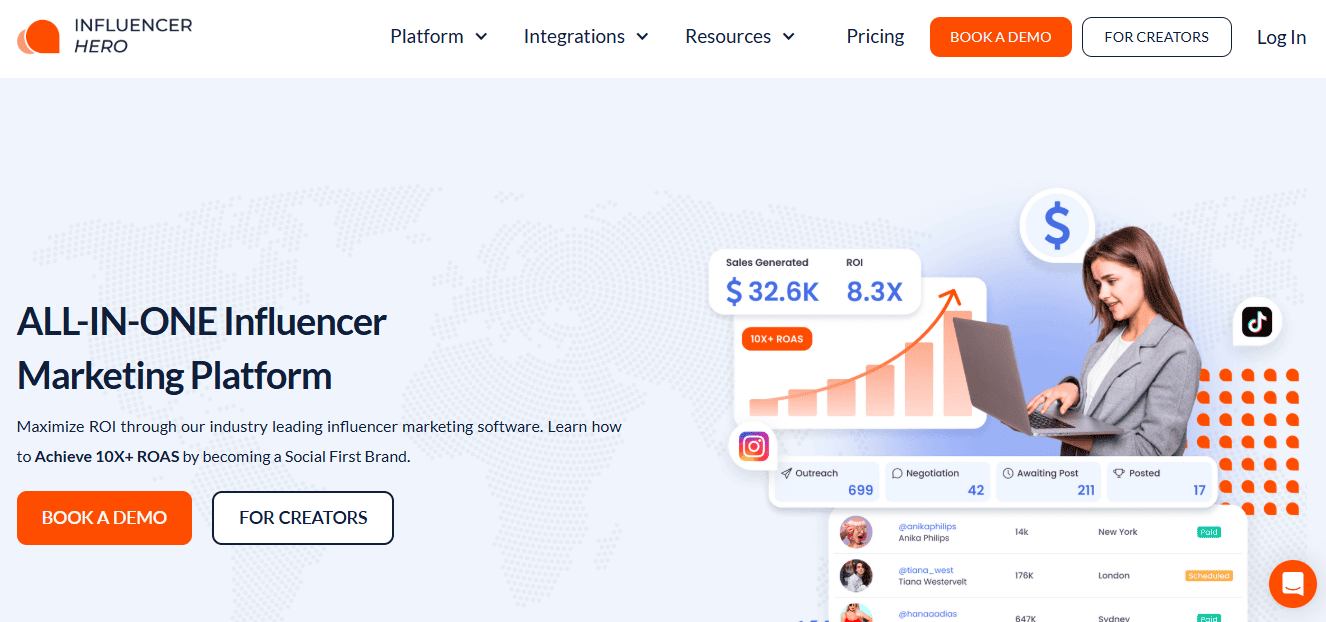
Best For: Growing D2C brands, eCommerce teams, and agencies looking for an all-in-one influencer marketing solution with advanced CRM, multi-platform support, and AI-powered automation to scale influencer and affiliate campaigns efficiently.
Platform Coverage:
Pricing: Influencer Hero offers flexible pricing plans to accommodate growing brands. All plans include core features and can scale as the influencer program grows.
Reviews: 5.0 / 5.0 (Capterra)
Ease of Use (UX/UI): Influencer Hero is known for its intuitive design and user-friendly interface, featuring a clean dashboard, automated workflows, and customizable email templates. The drag-and-drop campaign setup and Chrome extension make managing influencer programs seamless and time-efficient.
Customer Support: Delivers 24/7 real-human live chat, responsive email support, and an extensive Help Center filled with written and video tutorials. Every plan includes a dedicated account manager from day one, with optional strategy consultations available to help guide growth. Pro plan users also receive access to a private Slack channel for quicker, continuous support.
Influs is attractive for entry-level budgets with three monthly tiers, Starter ($49.90), Agency ($99.90), and Business ($199.90), and a 14-day trial, but users often outgrow its workflow flexibility and depth as they scale.
Influencer Hero starts higher: Standard ($649), Pro ($1,049), Business ($2,490), and Custom—yet bundles advanced CRM, AI-personalized outreach, storefronts/affiliate, and broader multi-platform coverage that reduce add-ons and tool switching.
If budget is the primary constraint and your needs are lighter, Influs’s lower monthly tiers are compelling for early-stage programs. On the other hand, if you’re optimizing for long-term ROI and team efficiency, Influencer Hero’s feature breadth (discovery, CRM, gifting, reporting, affiliate/storefronts) and premium support (dedicated AM + live chat) make it a stronger “scale-up” choice for D2C brands and agencies.

Best For: Modash is ideal for eCommerce brands—especially those on Shopify—looking to manage the entire influencer marketing process in one platform, from discovery and outreach to affiliate tracking and payouts. It’s also a strong choice for brands needing access to one of the largest creator databases without opt-in limitations.
Platform Coverage:
Pricing: There are different plans and options.
Reviews: 4.7/5 (G2)
Ease of Use (UX/UI): Users consistently praise Modash’s clean, intuitive interface and logical workflow. Many find that the platform’s step-by-step approach—from searching for creators to tracking campaign performance—reduces the time needed to get campaigns up and running. The AI-powered search and visual discovery tools are particularly appreciated for making the influencer search process quicker and more accurate.
Customer Support: Modash users highlight the platform’s responsive and knowledgeable support team. New customers report smooth onboarding experiences, with clear guidance on search using discovery filters, outreach tools, and affiliate tracking. The availability of direct support during setup helps brands launch campaigns faster and with fewer technical hiccups.
Influs is more budget-friendly upfront, starting at $49.90/month, and focuses heavily on AI-powered influencer matching, fraud detection, and detailed performance analytics. However, its database is smaller compared to Modash, and the outreach workflows are less customizable for complex campaigns.
Modash, starting at $199/month for the Essentials plan, offers access to over 350M public influencer profiles, making it significantly more powerful for large-scale discovery. It also includes robust Shopify integrations for gifting, affiliate tracking, and automated payouts, plus advanced search features like “Find Your Fans” and lookalike discovery.
While Influs may be the better fit for smaller brands or agencies looking for cost-effective AI-driven matching, Modash is ideal for Shopify-based eCommerce brands that need deep discovery capabilities, built-in outreach tools, and affiliate automation in one streamlined system.

Best For: Sprout Social is best suited for enterprise-level brands and agencies managing large-scale influencer campaigns that require advanced analytics, brand safety monitoring, and content approval workflows. It’s ideal for organizations willing to commit to annual contracts and invest in premium-level campaign tracking and competitive insights.
Platform Coverage:
Pricing & Commitment: Pricing varies depending on every brand's needs.
Reviews: 4.5 / 5.0 (Capterra)
Ease of Use (UX/UI): Users describe Sprout Social’s interface as polished and professional, with clear workflows for campaign management, from creator discovery to performance tracking. The dashboard’s customizable views make it easier to focus on the most relevant metrics. While the platform’s depth can feel overwhelming at first, enterprise teams find its organization logical and supportive of complex campaigns.
Customer Support: Sprout Social’s customer support receives high marks for responsiveness and detailed guidance, particularly during onboarding for multi-user teams. Enterprise clients note that the support team is proactive in providing training resources, helping set up custom reports, and ensuring smooth integration with Shopify and PayPal. The dedicated account management is appreciated for maintaining campaign momentum.
Influs offers a significantly more affordable entry point, with plans starting at $49.90/month, making it attractive for small to mid-sized brands seeking AI-powered influencer matching, real-time analytics, and fraud detection. However, its smaller influencer database and simpler outreach tools may limit scalability for global campaigns.
Sprout Social, on the other hand, is positioned as a premium enterprise solution at $1,599 per user/month with a 12-month minimum commitment. It offers robust analytics, brand safety monitoring, content approval workflows, and competitive benchmarking that Influs does not match. For large brands managing multiple stakeholders, these features justify the higher cost, especially when brand reputation and campaign accuracy are top priorities.
In short, Influs is the budget-friendly, agile option for smaller teams focused on AI-driven matching, while Sprout Social is the choice for enterprises seeking the most advanced analytics, brand protection tools, and structured campaign workflows in a single platform.

Best For: Upfluence is ideal for eCommerce brands, especially Shopify and Amazon sellers, looking for an end-to-end influencer marketing solution that integrates search, outreach, affiliate tracking, and payments in one platform.
Platform Coverage:
Pricing:
Reviews: 4.5/5 (G2)
Ease of Use (UX/UI): Users praise Upfluence’s clean and modern interface, with intuitive filtering for influencer searches and streamlined outreach workflows. However, due to its depth of features, some new users mention a learning curve before fully leveraging its capabilities, especially when setting up integrations and campaign tracking.
Customer Support: Upfluence provides responsive customer support, with dedicated account managers to guide onboarding and campaign setup. Many users highlight the team’s proactive assistance in optimizing integrations like Shopify and Amazon, though the high-touch service is partly reflected in the platform’s premium pricing.
Influs is a more budget-friendly, AI-powered influencer discovery and campaign management tool, starting at $49.90/month, making it attractive for small businesses or agencies seeking affordable AI-driven matching, real-time analytics, and fraud detection. However, it has a smaller creator database, limited outreach customization, and fewer deep integrations compared to Upfluence.
Upfluence, on the other hand, comes at a premium price of $1,276/month (annual contract) but offers a truly end-to-end solution—including advanced outreach automation, CRM, affiliate tracking, bulk payments, and deep integrations with Shopify and Amazon. Its ability to turn existing customers into brand advocates with high ROI makes it especially appealing to established eCommerce brands that want both scale and tracking depth.
If budget is your primary concern and you value AI-powered discovery at a lower cost, Influs is the better fit. But if you need enterprise-level integrations, robust tracking, and an all-in-one influencer marketing workflow, Upfluence is the stronger long-term investment.

Best For: Captiv8 is best suited for large brands and enterprises looking for deep influencer analytics, competitive tracking, and high-level campaign management, especially those with the budget for premium features like creator storefronts and affiliate commerce programs.
Platform Coverage:
Pricing: There are different pricing options:
Reviews: 4.1/5 (G2)
Ease of Use (UX/UI): Users appreciate Captiv8’s advanced filtering capabilities, customizable reports, and collaboration tools for managing large-scale campaigns. However, some mention that while the interface is powerful, the sheer number of features can feel overwhelming at first, requiring onboarding time to fully utilize its potential.
Customer Support: Feedback on customer support is mixed. While some enterprise clients receive attentive service, multiple reports from both brands and creators mention unresponsiveness and unresolved issues, particularly around payment processing. This inconsistency makes support a common concern for prospective users.
Influs is an affordable AI-powered influencer marketing tool starting at $49.90/month, making it a strong choice for small to mid-sized businesses seeking advanced influencer matching, audience analysis, and fraud detection without breaking the budget. While Influs offers a smaller creator database compared to Captiv8, it provides real-time analytics, automated outreach tools, and Shopify integration at a fraction of Captiv8’s cost.
Captiv8, in contrast, is an enterprise-focused platform priced at $25K annually plus a $3K onboarding fee, with optional storefront and affiliate features costing an additional $20–30K per month. It offers unparalleled filtering options, competitive tracking, deep performance analytics, and robust collaboration tools—features that are most valuable for large brands running complex, multi-team campaigns.
For startups or growing brands, Influs provides a cost-effective, AI-driven solution with a gentler learning curve. However, if your brand requires highly detailed influencer intelligence, enterprise-level collaboration, and budget is not a limiting factor, Captiv8 delivers a deeper, more competitive feature set.

Best For: Enterprise brands, agencies, and global companies needing an end-to-end influencer marketing solution with advanced discovery, campaign management, and reporting capabilities. CreatorIQ is ideal for teams managing large-scale influencer programs across multiple markets and platforms.
Platform Coverage:
Pricing: There are different plans:
Reviews: 4.7/5 (G2)
Ease of Use (UX/UI): Users often highlight CreatorIQ’s clean, professional interface and logical workflow that supports the full influencer marketing lifecycle. While the range of features is extensive, the platform’s structured menus and CRM-like organization help teams manage large campaigns without feeling cluttered. Some note that the depth of options requires a brief learning curve, especially for new users.
Customer Support: CreatorIQ earns praise for its dedicated customer success team and implementation managers who guide onboarding, campaign setup, and strategic planning. Many appreciate the proactive support and quarterly check-ins, with users noting that the company’s partnerships with major social platforms also bring early access to new features.
Influs is a more budget-friendly, AI-driven influencer discovery platform starting at $49.90/month, making it attractive for small to mid-sized businesses and agencies looking for real-time matching and performance analytics without committing to high annual contracts. It offers powerful audience analysis, fraud detection, and Shopify integration, though some users report a steeper learning curve and a smaller influencer database compared to enterprise solutions.
CreatorIQ, on the other hand, is designed for enterprise-scale influencer programs with budgets in the $2K–$5K/month range. It provides an end-to-end workflow covering discovery, outreach, campaign management, and reporting, backed by direct API integrations with Meta, TikTok, and YouTube for reliable, real-time data. While it requires annual contracts and comes at a higher price point, its scalability, strategic support, and advanced CRM and reporting capabilities make it a better choice for large brands managing complex, multi-market campaigns.
If you’re a smaller brand or agency prioritizing cost efficiency and AI-powered matching, Influs is the more accessible choice. If you’re an enterprise brand seeking deep integrations, strategic partnerships, and global-scale influencer management, CreatorIQ delivers the breadth and depth needed for long-term, large-scale success.

Best For: Brands and agencies seeking a powerful influencer discovery tool with advanced AI filtering, social listening, and integrated campaign tracking. Ideal for marketers who want deep audience authenticity checks and eCommerce ROI measurement in one platform.
Platform Coverage:
Pricing: HypeAuditor’s pricing is customizable, with the standard “Business” plan starting at around $10,000/year. Pricing can be adjusted based on the number of reports, active campaigns, and platform usage. They also offer a 24–48 hour free trial for new users.
Reviews: 4.6/5 (G2)
Ease of Use (UX/UI): Users generally find HypeAuditor’s interface modern and professional, with intuitive filters and reporting tools. The dashboard organizes influencer search, outreach, and tracking in a way that feels data-rich yet accessible. Some beginners, however, mention needing onboarding sessions to fully utilize its advanced features.
Customer Support: HypeAuditor provides responsive support during onboarding and ongoing campaigns, with access to a dedicated success manager for higher-tier plans. Users highlight that the support team is knowledgeable and proactive, especially when customizing campaigns or troubleshooting reporting metrics.
Influs is a lower-cost AI-powered influencer platform starting at $49.90/month, making it ideal for small to mid-sized brands seeking real-time influencer matching, audience analysis, and fraud detection without a large upfront investment. It also offers Shopify integration and advanced campaign analytics, though its creator database is smaller and outreach workflows are less customizable compared to enterprise tools.
HypeAuditor, in contrast, starts at a much higher entry point—around $10K/year for its standard plan—but delivers advanced AI-powered search, social listening, audience authenticity scoring, and integrated eCommerce ROI tracking. It has a significantly larger searchable database (200M+ influencers), though only 200K are registered for direct applications.
If budget is your main concern and you want an AI-driven solution that covers the basics of influencer discovery and tracking, Influs is the more accessible option. If you need advanced audience verification, multi-platform social listening, and in-depth ROI tracking tied to eCommerce sales, HypeAuditor is the better choice—especially for brands running larger, more data-driven campaigns.

Best For: DTC and eCommerce brands wanting to manage every stage of influencer programs—from product seeding and gifting to affiliate tracking, payments, and UGC collection—within one unified platform.
Platform Coverage:
Pricing:
Reviews: 4.5 / 5.0 (G2)
Ease of Use (UX/UI): Users generally find GRIN’s interface intuitive, especially for brands already using eCommerce platforms like Shopify or WooCommerce. The unified dashboard minimizes the need to switch between tools, although some users mention occasional slow load times and minor bugs that disrupt workflow. The creator portals are particularly appreciated for their simplicity, requiring little to no training for influencers.
Customer Support: GRIN offers dedicated program strategists for brands that want more hands-on guidance, which many users find valuable. However, while some users report helpful and knowledgeable support, others have experienced long response times or unresolved tickets, especially for technical issues.
Influs is positioned as a more cost-accessible option, with plans starting at $49.90/month, making it appealing to smaller brands and agencies that still want AI matching, real-time analytics, and fraud detection.
GRIN, on the other hand, starts at around $25,000/year and is designed for established DTC and eCommerce brands needing advanced eCommerce integrations, unlimited creator partnerships, and full campaign lifecycle management in one place.
In terms of functionality, Influs focuses heavily on AI-driven matching, audience authenticity checks, and detailed filtering, but it lacks some of the deep eCommerce gifting, affiliate payment automation, and UGC rights management that GRIN offers out of the box.
GRIN’s tighter integrations with platforms like Shopify and PayPal make it ideal for brands with frequent product seeding and affiliate campaigns, whereas Influs is better suited for those who prioritize affordability and audience quality analysis over operational automation.
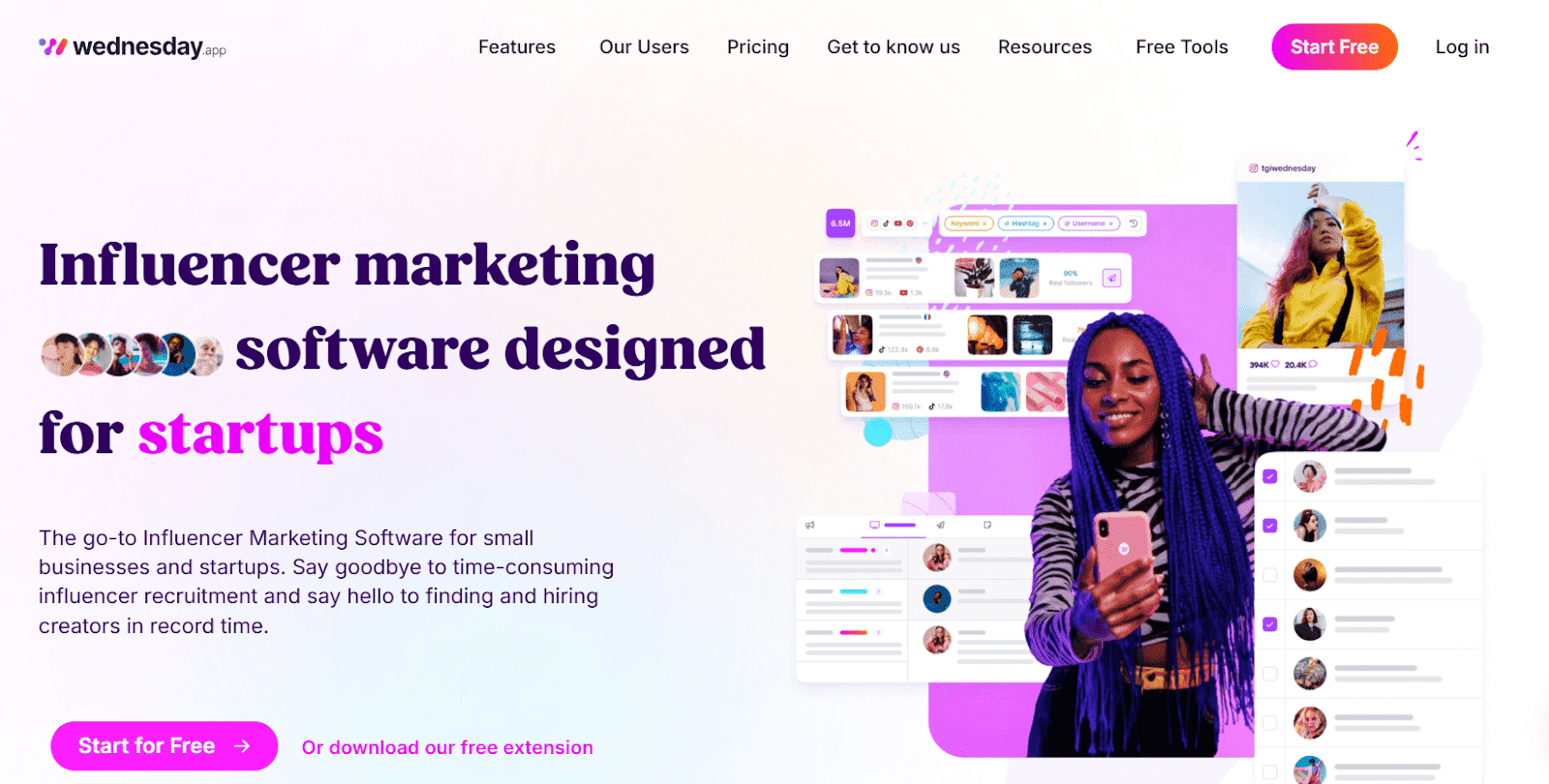
Best For: Small to mid-sized businesses looking for an affordable, all-in-one influencer discovery and CRM solution without enterprise-level costs or long-term commitments. Ideal for brands launching or scaling influencer programs on a budget.
Platform Coverage:
Pricing:
Reviews: 4.6/5.0 (G2)
Ease of Use (UX/UI): Users praise Wednesday for its clean, minimal interface that makes it easy to navigate without feeling overwhelming. The lightweight design keeps the focus on discovery and outreach, avoiding unnecessary complexity. However, free-plan restrictions—like limited results and profiles—can feel restrictive for those testing the platform extensively.
Customer Support: Wednesday offers quick onboarding with accessible email support, and the free plan’s no-credit-card signup makes it easy to test before committing. While there’s no dedicated account manager for most plans, users find the help documentation clear, and the $1 premium trial allows hands-on access to advanced support features.
Influs starts at $49.90/month and offers advanced AI-driven matching, real-time analytics, and fraud detection, making it appealing to agencies and data-focused brands willing to invest more in deep campaign insights.
In contrast, Wednesday.App caters to smaller brands and startups with a free plan, a $79/month mid-tier, and an affordable entry into AI-powered discovery and CRM features.
Functionally, Influs leans toward advanced data capabilities, audience authenticity checks, and more granular filtering, but it can feel overwhelming for beginners. Wednesday.App prioritizes ease of use, quick onboarding, and a clean interface while sacrificing some enterprise-level analytics and integrations.
Influs may be better suited for brands with complex campaigns and higher budgets, while Wednesday.App is ideal for those starting influencer marketing or operating with tighter budgets.
For brands deciding between the two, the choice comes down to scale and sophistication: choose Influs if you need deeper analytics and robust AI matching at a mrate monthly cost, and Wednesday.App if you want a simple, budget-friendly, no-contract tool to get influencer marketing efforts off the ground.
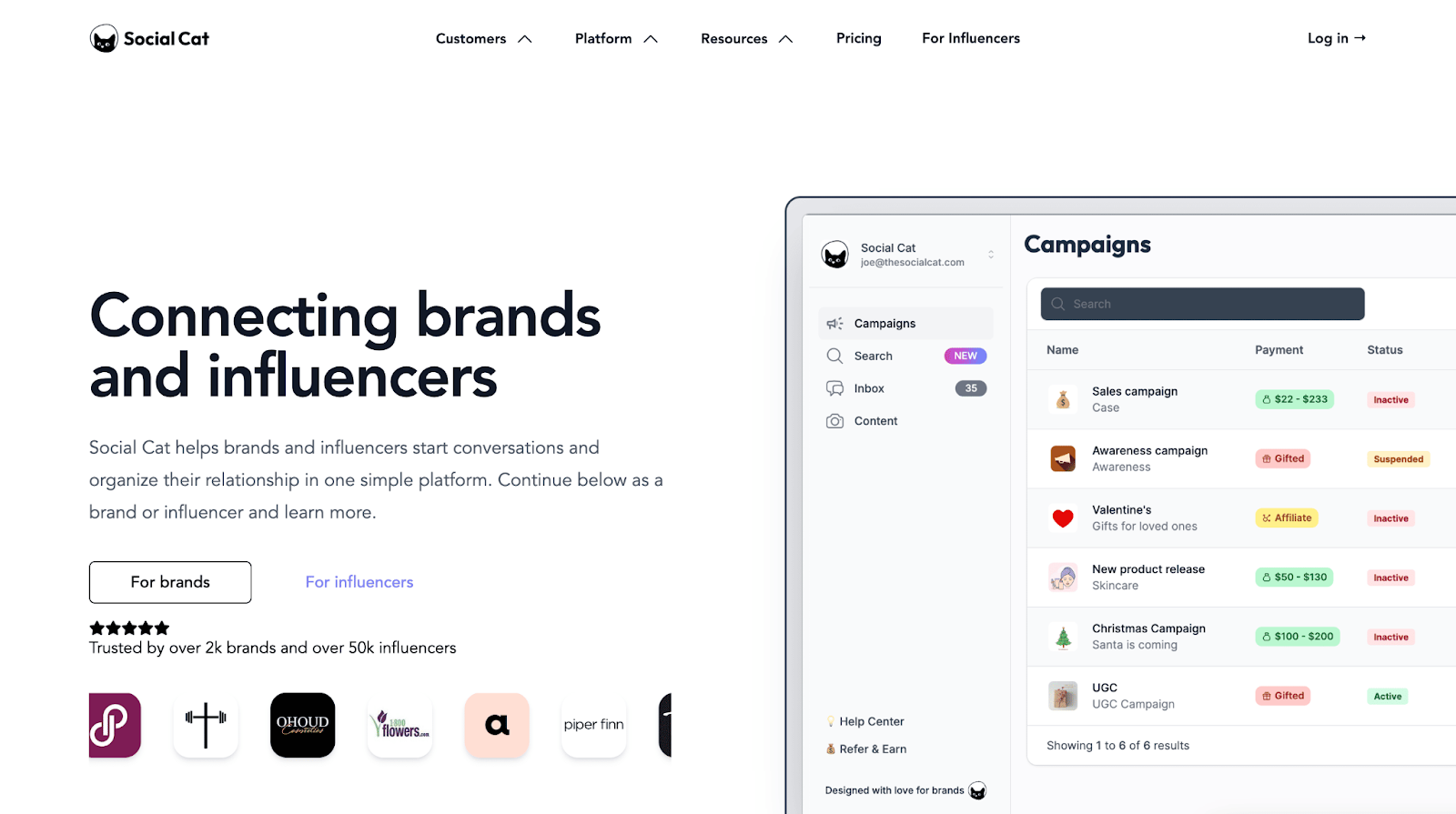
Best For: Small to medium-sized brands looking to streamline influencer discovery, build relationships, and run product seeding campaigns without the complexity or cost of enterprise tools.
Platform Coverage:
Pricing:
Review: 4.3/5.0 (Trustpilot)
Ease of Use (UX/UI): Users often highlight Social Cat’s beginner-friendly interface, noting that the platform is intuitive and easy to navigate, even for teams new to influencer marketing. Its campaign builder, in-app messaging, and clear collaboration processes make managing influencer partnerships straightforward without steep learning curves.
Customer Support: Feedback suggests that Social Cat’s customer support is responsive and personal, especially for brands on higher plans that include priority support. Email and in-app communication options ensure quick assistance, and dedicated support tiers offer faster responses and guidance for scaling campaigns.
Influs is a data-first, AI-powered platform with advanced analytics, real-time tracking, and fraud detection—making it a strong choice for brands and agencies running large-scale, data-heavy campaigns. Its pricing starts at $49.90/month and scales up to $199.90/month, with a focus on automation and in-depth performance monitoring.
Social Cat, on the other hand, takes a relationship-first, simplicity-driven approach, focusing on influencer applications, built-in content usage rights, and manual matchmaking. It’s ideal for small to medium brands that want an affordable, easy-to-use tool without the complexity of AI and deep analytics. Pricing starts at $99/month and scales to $299/month, with clear limits on the number of creators and campaigns per plan.
In short, choose Influs if you need AI-powered discovery, deep analytics, and scalability for multi-platform campaigns. Choose Social Cat if you value simplicity, predictable content usage rights, and a hands-on collaboration model for micro and nano influencer partnerships.
The best Influs alternative depends on your goals—whether you need powerful AI analytics, a simple collaboration tool, or a cost-effective way to work with influencers. While Influs excels in data-driven matching, some brands may prefer simpler, more affordable platforms.
Influencer Hero is one of the top all-in-one options, combining discovery, outreach, CRM, tracking, and UGC tools in one place. Book your free demo today to see how we can help you run influencer campaigns that deliver results.

Some of the top influencer marketing platforms include Influencer Hero, Grin, Modash, Aspire, and Upfluence. Influencer Hero is a standout all-in-one tool with influencer discovery, outreach automation, CRM, tracking, affiliate management, and UGC tools, making it ideal for brands and agencies of all sizes.
If you want to focus on micro-influencers, Influencer Hero provides advanced filters to find creators by niche, audience size, location, and engagement rate. Social Cat is another good option for brands looking to collaborate with micro and nano influencers on Instagram and TikTok.
Yes. Influencer Hero offers competitive pricing while combining multiple features—like influencer search, automated outreach, analytics, and UGC management—into one platform, reducing the need for multiple subscriptions. Social Cat and Modash are also budget-friendly for smaller teams.
Influencer Hero is one of the best all-in-one platforms, covering every stage of influencer marketing—from discovery and outreach to performance tracking and affiliate management. This makes it easier to run end-to-end campaigns without juggling different tools.
With Influencer Hero, you can track key metrics like engagement rates, conversions, affiliate sales, and UGC performance directly in the platform. Other tools like Grin or Upfluence also provide analytics, but Influencer Hero stands out for offering these capabilities alongside a built-in CRM and automated outreach features.



Schedule a Demo with one of our media experts below.